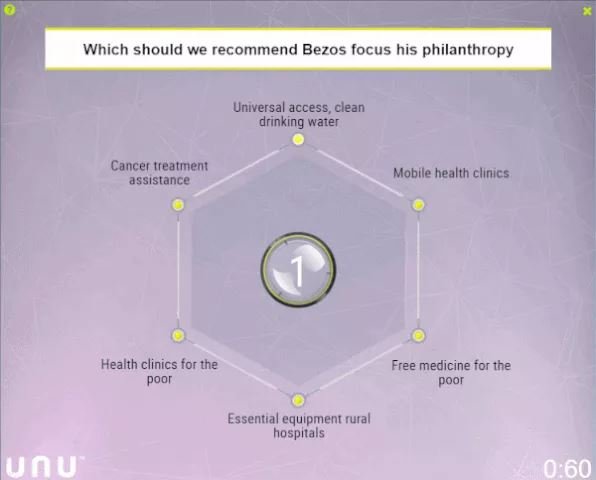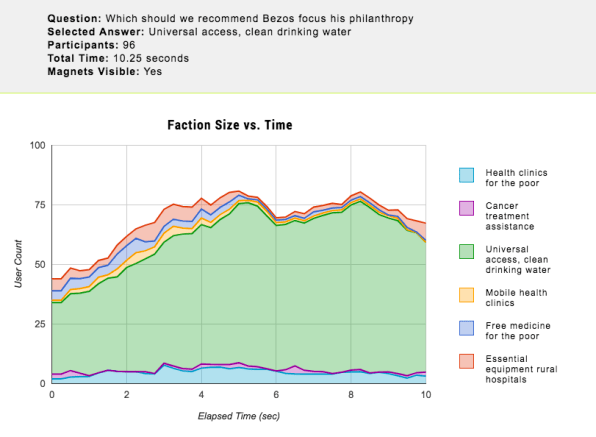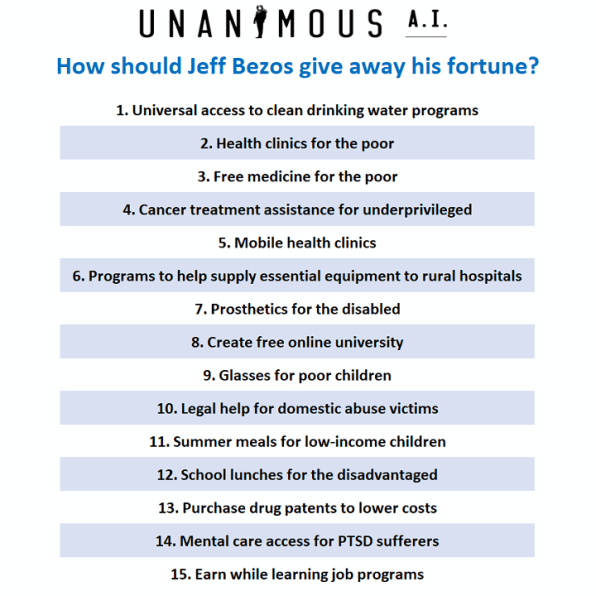After tweeting a request for ideas about how he should direct his future philanthropy, a company that specializes in harnessing the wisdom of crowds used their tech to find consensus on how the world thinks the Amazon founder should donate his billions.

With a net worth of $86 billion, Jeff Bezos certainly has enough money to change the world. What he’s lacked, apparently, was some direction for how to spend it. In mid-June, the Amazon founder tweeted a “request for ideas” worth philanthropically investing in that would help society, both short-term–“here and now”–and in the long run, as he put it: “at the “intersection of urgent need and lasting impact.”
That question generated more than 46,000 responses on Twitter, leaving Bezos with another issue. How to sort and weigh all that feedback? Louis Rosenberg, the founder of Silicon Valley-based Unanimous AI had an answer, and decided to show it off using Bezos’s responses. Rosenberg and his company specialize in a form of advanced decision making called swarm intelligence, basically a computer-enhanced way to get humans to communicate like honeybees do in nature, by tapping into the experiences of large groups of individuals to make the most complete community decision possible.
In the name of social progress–and certainly some self-promotion–Rosenberg turned his tech on Bezos’s information-overload problem. It took some tricky methodology and lots of processing power inside a customized platform, but the result was rather surprising. Turns out, Americans feel most strongly about things like cancer treatment assistance, cheaper medicine, and mobile health clinics.
Some of those things might be personally driven: It seems like everyone knows someone whose life has been touched by cancer, and huge swaths of America don’t have affordable access to healthcare or decent nearby services. Ultimately, however Rosenberg’s simulated swarm unanimously picked a basic and fundamental issue for Bezos to focus on: universal access to clean drinking water.
It’s the universality of that issue that Rosenberg finds interesting. While concerns about water safety continue to grow in the U.S. (lead contamination likely goes far beyond Flint, Michigan), access to safe, readily available water remains a critical issue in the developing world, as well.
“A swarm by their very nature encourages a group to find the places where they agree,” says Rosenberg. “And as a result they tend to find the solutions that are best for the greater good as opposed to forming factions that are defending their own interests.” More data shows that nearly everyone ended up happy and confident in that answer.
THE BUZZ ABOUT SWARMING
Most artificial intelligence systems set out to mimic and improve neurological intelligence, using sets of algorithms and machine learning to solve challenges with more processing power at greater speeds than humans are capable. That’s prompted fears (and a well-known movie franchise) about sentient beings becoming self-aware.Despite its sci-fi sounding name, though, an artificial hive mind keeps humans at the center of each transaction. “Instead of just being a system of neurons where intelligence emerges,” says Rosenberg, “swarm intelligence is a system of organisms where super intelligence emerges.”
Take bees, for instance. Individually, they aren’t very smart. But bees don’t think on their own when it comes to important decisions. Instead, each bee shares what information it has about a certain scenario through vibrations with the group, allowing the swarm to decide, in real time, based on lots of feedback, what action might be best for collective survival.
Same goes for birds that flock, fish that school, and ants that assemble into colonies. “They’re smarter together,” Rosenberg says. “It’s about enabling groups of organisms to be connected in real time with feedback loops so that they can converge on optimal solutions and they can basically amplify their intelligence.”
Unanimous’s technology mimics that process, using a platform called Unu, an online community managed by the company that works a lot like a virtual Ouija board. It generally asks one question, with six answers arranged at different points around a hexagonal ring. In the center of the ring there is a translucent, circular puck, which online participants on the company’s platform can tug with their cursor toward whatever answer they deem the best.
Those people may be located all over the U.S., but each cursor is represented on a shared screen by a tiny magnet icon, so that as the puck moves toward one answer or another, those within the swarm can see where the decision might be headed, and where others are trying to pull it. If there’s another solution they might prefer to the pending outcome that seems to also have a lot of support, they can shift their alliance, tugging the puck in that direction.
Since it was launched in 2015, Unanimous AI has used its “wisdom of crowds” process most for easily quantifiable problem solving: In 2016, its “Swarm AI” process predicted far more Oscar winners (11 of 15 categories) than polled moviegoers or even top critics. It has also beaten legions of traditional gamblers when placing Vegas-style bets on the Super Bowl (68% of all prop bets paid off). In fact, one month before Bezos’s charity advice tweet, Unanimous AI correctly called the top four finishers in the Kentucky Derby for an extremely rare superfecta, turning Rosenberg’s promotional $20 bet into about $11,000.
In swarming, the options always max out at six to avoid confusion known as “choice overload.” Twitter didn’t cough up six ideas though–it offered tens of thousands.
GETTING BEZOS AN ANSWER
To vet the submissions, Unanimous created a simple language filter, grouping repetitive ideas that shared similar themes into a smaller set of 200 different suggestions. Next, the group asked 300 volunteers to grade each idea on a scale of 1 to 10, based on Bezos’s critera. Proposals with a cumulative average of at least 7 or higher moved on for final consideration leaving a field of 25 potential solutions.From there, Unanimous began a process of elimination game inside their platform. They asked 100 users on Unu to review the 25 remaining ideas in batches of 6, tugging the puck toward whichever the community thought would be least helpful. The system deleted the loser, reshuffled the five survivors, and began the process of elimination again, until, eventually, the pool was reduce to six finalists: cancer treatment assistance, universal access to clean drinking water, mobile health clinics, free medicine for the poor, essential equipment for rural hospitals, and health clinics for the poor.
Once the six finalists were chosen, Unu offered a direct question to the swarm: “Which should we recommend Bezos focus his philanthropy?” The swarm took about 10 seconds to tug the puck toward their decision: universal access to clean drinking water.
GETTING TO CLEAN WATER
As you can see in the animation below, water equality wasn’t necessarily everyone’s first choice, but as the puck began to move, it became far favorable than some others on the board, which lead to an acceptable group decision.
Afterward, Unanimous generated a factional analysis to highlight how allegiances shifted during the tug of war. Nearly everyone appears to have quickly reconciled that clean water was important. Based on some internal math that accounts the zigs-and-zags, Unanimous estimates that the swarm is 85% confident in its answer.

To ensure that the decision met all of Bezos’s criteria, Rosenberg rephrased that question and ran other swarms, focusing specifically on which solution might be the most urgent, have lasting impact, and affect the most people. Each time, though, drinking water topped out.
The swarm’s decision for Bezos to tackle water rights, perhaps against its own immediate self-interest for cheaper meds or a cancer breakthrough, parallels research that shows how swarms often perform far better than disconnected individuals in “tragedy of the commons” scenarios, which tempt people to take more than a fair share of some potential community windfall, with the risk that if too many people get greedy everyone might get nothing.
In second place is health clinics for the poor, followed by free medicine for the poor, and then cancer treatment assistance. Further down, concepts like a free online university, providing glasses to poor children, legal help for domestic abuse victims, purchasing drug patents to lower costs, and “earn while learning” jobs programs all made the list.

Whether Bezos is actually taking the responses to his tweet to heart remains to be seen, but if it was an attempt at coming to some sort of democratic decisions about his future philanthropy, he now has his answer.
Repost: https://www.fastcompany.com/40449077/jeff-bezos-asked-the-world-how-to-donate-his-money-this-artificial-hive-mind-knows-the-answer
Este Post ha recibido un Upvote desde la cuenta del King: @dineroconopcion, El cual es un Grupo de Soporte mantenido por @wilbertphysique, @yoenelmundo y 5 personas mas que quieren ayudarte a llegar hacer un Top Autor En Steemit sin tener que invertir en Steem Power. Te Gustaria Ser Parte De Este Projecto?
This Post has been Upvote from the King's Account: @dineroconopcion, It's a Support Group run by @wilbertphysique, @yoenelmundo, and 5 other people that want to help you be a Top Steemit Author without having to invest into Steem Power. Would You Like To Be Part of this Project?
This post has been ranked within the top 80 most undervalued posts in the first half of Aug 14. We estimate that this post is undervalued by $14.14 as compared to a scenario in which every voter had an equal say.
See the full rankings and details in The Daily Tribune: Aug 14 - Part I. You can also read about some of our methodology, data analysis and technical details in our initial post.
If you are the author and would prefer not to receive these comments, simply reply "Stop" to this comment.
Over-all we all need money. Thanks @dharmavir
Congratulations @dharmavir! You have completed some achievement on Steemit and have been rewarded with new badge(s) :
Click on any badge to view your own Board of Honor on SteemitBoard.
For more information about SteemitBoard, click here
If you no longer want to receive notifications, reply to this comment with the word
STOP